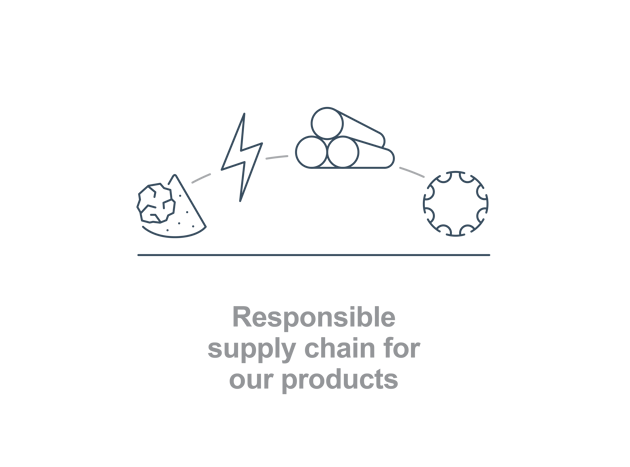Wir verpflichten uns, bei unseren Lieferanten unter anderem die Grundsätze der Allgemeinen Erklärung der Menschenrechte, des UN Global Compact und der IFC zu fördern. Unser Ansatz zur verantwortungsvollen Beschaffung basiert auf den OECD Due Diligence Guidance for Responsible Business Conduct und lässt sich in drei Hauptschritten zusammenfassen:
Feststellen von Risiken
Vor der Zusammenarbeit mit Hydro durchlaufen alle Lieferanten einen Qualifizierungsprozess. In diesen Prozess einbezogen sind Risiken in Bezug auf Geschäftspraktiken, Menschenrechte, Arbeitsbedingungen und Umwelt. Wenn wir Bedenken in Bezug auf diese Probleme feststellen, führen wir eine umfassendere Überprüfung der potenziellen Lieferanten durch, um zu klären, ob der Lieferant unsere Anforderungen erfüllt, bevor Vereinbarungen unterzeichnet werden. Wir bewerten unsere Lieferkette und überwachen Risiken kontinuierlich.
Klare Erwartungen
Lieferanten, die in einer direkten Vertragsbeziehung mit Hydro stehen, müssen sich an die im Verhaltenskodex für Lieferanten von Hydro festgelegten Grundsätze halten. Der Kodex basiert auf international anerkannten Standards wie den acht Kernkonventionen der ILO-Erklärung (International Labour Organization). In unseren Standardverträgen haben die im Kodex festgelegten Grundsätze Vertragsklauseln. Die Nichteinhaltung der Grundsätze kann zur Kündigung des Vertrages führen.
Unterstützung und Entwicklung
Wir bauen unsere Beziehung zu unseren Lieferanten auf gegenseitigem Vertrauen und Entwicklung auf. Wir diskutieren und fördern aktiv ethische Geschäftspraktiken, sichere Arbeitsbedingungen, Menschenrechte und Umweltfragen. Durch Instrumente wie regelmäßige Reviews und Audits tragen wir zur kontinuierlichen Weiterentwicklung bei. Wir sind ein aktives Mitglied von ASI und fördern das Zertifizierungsprogramm von ASI bei unseren Lieferanten für eine nachhaltige Entwicklung ihres Geschäfts. Wir arbeiten auch mit anderen externen Stakeholdern wie Gewerkschaften und Industrieverbänden zusammen, um Entwicklungsprogramme für Lieferanten zu entwickeln und umzusetzen.
Konflikt Mineralien
Als Teil der Verpflichtung von Hydro zur Verantwortung, einschließlich unserer Menschenrechtsrichtlinie zur Achtung der Menschenrechte in unseren eigenen Betrieben und in unserer Lieferkette, ist Hydro bestrebt, Rohstoffe, die die Verwendung von Zinn, Tantal, Wolfram oder Gold (bekannt als 3TG) erfordern, aus konfliktfreien Quellen zu beschaffen. Im Allgemeinen ist die Beschaffung von 3TG durch Hydro mit wenigen Ausnahmen kleiner Mengen begrenzt.
Hydro erwartet von seinen Lieferanten, dass sie über angemessene Richtlinien und Due-Diligence-Maßnahmen verfügen, die es uns ermöglichen, angemessen festzustellen, ob Produkte und Rohstoffe, die Konfliktmineralien enthalten, aus konfliktfreien Quellen stammen, einschließlich solcher aus der Demokratischen Republik Kongo (DRC) und ihrer umgebende Bereiche.
Zur Unterstützung dieses Vorhabens wird Hydro:
- Bei unseren relevanten Lieferanten Sorgfalt walten lassen im Einklang mit der Due Diligence Guidance for Responsible Supply Chains of Minerals from Conflict-Affected and High-Risk Areas der Organisation für wirtschaftliche Zusammenarbeit und Entwicklung und von diesen Lieferanten erwarten, dass sie dasselbe mit ihrer individuellen Lieferkette tun
- Engagement und Zusammenarbeit mit unseren Lieferanten, um die Verwendung einer konfliktfreien Lieferkette für Hydros Produkte zu kommunizieren
- Falls sich herausstellt, dass uns ein direkter Lieferant mit notwendigen Konfliktmineralien beliefert, die nicht über eine validierte Lieferkette beschafft wurden oder die anderweitig Konflikte finanziert haben, werden wir Maßnahmen ergreifen und beispielsweise empfehlen, dass dieser Lieferant nach alternativen Mitteln sucht der Beschaffung, oder falls dies nicht möglich ist, werden wir die Lieferantenbeziehung neu bewerten
- Regelmäßige Überprüfung unsere Position in Bezug auf Konfliktmineralien, um zusätzlich zu den grundlegenden Verpflichtungen unserer Lieferanten zur Einhaltung der Hydro-Standards eine kontinuierliche Eignung sicherzustellen.
Der Verhaltenskodex für Lieferanten von Hydro legt die Mindestanforderungen für alle unsere Lieferanten fest.
Aktualisiert: 4. Juni 2024
